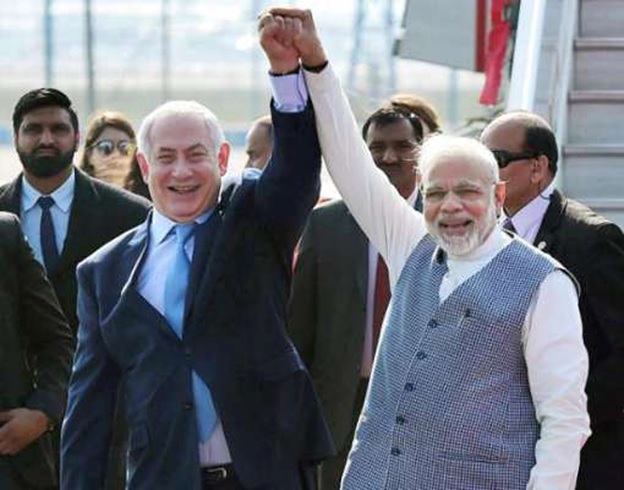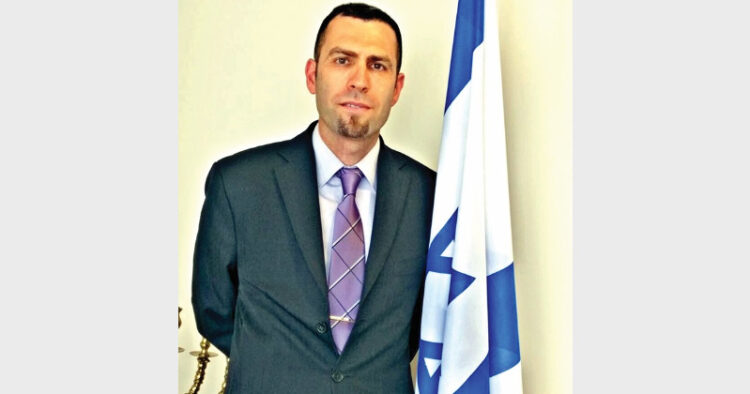The friendship between India and Israel got a huge fillip with Prime Minister Narendra Modi’s visit to Israel, which was reciprocated by a visit to India by his counterpart Benjamin Netanyahu. With every passing year cooperation between the two countries in the defence, the sector has been increasing. Both the counties are on the same page as far as ways and means to tackle the menace of terrorism is concerned. Beyond that what are the other areas in which the two counries are strengthening their relations. In an interview Organiser’s special correspondent Rajan Khanna speaks to Mr Ya’akov Finkelstein, Consul General of Israel, on all these aspects. Excerpts:
How do people of Israel perceive India and its people?
People of Israel view the Indians in the highly positive light. There is a huge amount of warmth among the Israeli people for the Indians. A big number of backpackers are visiting India every year They take back very sweet memories from here and act as messengers of Indian goodwill among their countrymen.
Indians, in general, have very positive views about Israel; what initiatives are being taken to convey the image of Israel?
Relations between the two countries have peaked after the bilateral visits of the Prime Ministers of both the countries. Business relations are also improving and a good number of events and initiatives in various Indian cities are being organised to give boost to business relations and to promote tourism.
How do you see both the countries twenty years from now?
I am very optimistic about the growing diplomatic ties between the two countries. There is a vast potential of the relations and cooperation that can contribute in a big way.
What role Israeli companies are playing in the ‘Make in India’ programme?
Many Israeli companies have formalised agreements with their Indian counterparts, not just in the defence sector, but also in agriculture.
Israel has a huge technology pool, how is it going to use it in India for joint ventures?
To promote research and development activities in India, Israeli and Indian governments have created a 40 million dollars fund called I4F to which both Israelis and Indians can apply. We are also encouraging Indian students to go to Israeli universities for higher studies, encourage cooperation between Indian and Israeli incubators and accelerators, and cyber experts.
What are the plans for defence joint production projects?
In the field of defence, a lot of cooperation is going on; besides that, the biggest challenge the humanity is facing is the scourge of terrorism. Both the countries are determined to take this challenge uncompromisingly. In the field of cyber security too, both the countries are cooperating to a great extent.
Israel has set examples as far as economising usage of water is concerned; how the Israeli companies are sharing their knowledge with the Indian ones?
This is another area where Israel has shared its expertise with the Indian entities in a big way. Israeli companies are manufacturing in India the parts and components required for water management and purification projects. Recently, an agreement was signed between the topmost Israeli governmental water management company, Mekorot and the Government of Maharashtra for a master plan for the drought-prone Marathwada region of the state. Our companies are providing sewage management solutions also, in the government as well as in private sector. A big amount of cooperation is afoot for water purification and desalination projects.
What are the highlights of the role played by the Indian origin Jews who migrated to Israel?
Indian Jews who migrated to Israel are a bridge between the two countries. They practice both the cultures and speak both Hebrew as well as Indian languages. Those who migrated from Maharashtra are observing Maharashtra day in Israel too. My own mother was born in Cochin. So I know first hand the great affection of Indian Jews for the motherland.
“As far as Indo-Israeli relations are concerned, even the sky is not the limit, because we have already launched together satellite to space”
How people to people relations in cultural terms can be established between the two countries?
Many steps are being taken in this regard. PM Modi announced that an Indian Culture Centre is going to be established in Israel. At present many cultural troupes from Israel routinely visit India. Israeli movies too have viewership in India and many artists and academicians routinely visit India.
PM Mr. Netanyahu, during his visit to India, had invited Bollywood to shoot on Israeli locations; how are you planning to attract more film units to do shooting in your country?
A MOU for coproduction was signed during his visit. We have allocated separate fund to promote film shootings at various locales in Israel. Recently Dharma productions, owned by Karan Johar shot a clip for its Hindi film ‘Drive’ there. We are taking steps to promote documentaries also to be made by Indian directors.
Kasol is the place in Himachal Pradesh which happens to be a favourite location of Israeli tourists; what is the reason?
I am not aware of any particular reason. Israelis love India and keep on visiting the country in huge numbers. Apart from visiting hill stations, they frequent Goa very much. Heritage sites are also a big attraction for them and they have a fondness for the holy city of Varanasi too.
What are the views of the Israeli tourists about the hospitality of Indians?
They go back very happy. The memories of this country remain etched in their minds for long and most of them want to come back to enjoy the warmth, beauty of this country and to do business with India.
How tourism can be developed between the two countries so that number of people from each country visit one another?
We have laid emphasis on connectivity. Now Delhi-Tel-Aviv direct flights have been operationalised in addition to Tel-Aviv Mumbai direct line. The development is going to boost tourism between the two countries. Besides, more cultural exchanges between two countries will result in further development of tourism industry in both the countries.
Recently the US recognised Jerusalem as the capital of Israel and the UN General Assembly passed a resolution rejecting the recognition with 128 countries including India voting in favour of the resolution. How do you view the development?
Israel-India relations enjoy a wide and solid foundation based on mutual respect, common interests and shared values. There were no full diplomatic relations between the two countries until the 1990″s but, now we are celebrating the silver jubilee of the establishment of the Israeli embassy in New Delhi. Similarly, we are hopeful that one day the government of India too will recognise Jerusalem as the capital of Israel.















Comments